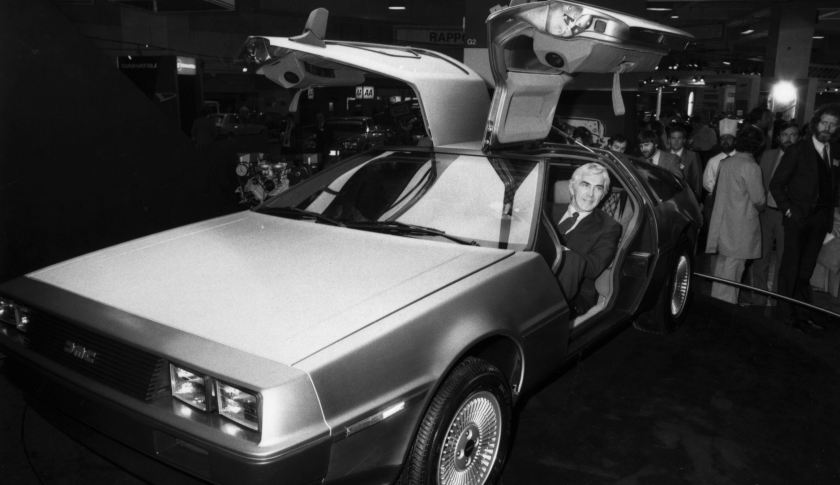
Fans, brands and virtually the entire Internet is celebrating ‘Back to the Future Day’ with an assortment of tributes. Mostly missing, however, is a nod to one businessman who is responsible for one of the movie’s most iconic creations.
That would be John Zachary DeLorean, the man who founded the DeLorean Motor Company and was the brains behind the falcon-winged DeLorean DMC-12, a sports car so ahead of its time it looks out of place even in today’s world. The car would become the Doc Brown-tweaked time machine synonymous with Back to the Future.
It was also the only car the DeLorean Motor Company ever produced, and a sad reminder of the promises many had for DeLorean when he founded the company in 1975. Before starting his own company, DeLorean was lauded as the person behind some of the industry’s most beloved and stylish vehicles, including the Pontiac GTO, the Pontiac Firebird, and the Chevrolet Vega.
An automotive engineer by training, DeLorean first entered the industry through Chrysler, and quickly landed at the Packard Motor Company in 1952. As its head of research and development, he was hand-picked for a similar role at General Motor’s [fortune-stock symbol=”GM”] Pontiac division.
He would end up as the youngest general manager in Pontiac’s history, and led the division to incredible success. A flamboyant, self-admitted rebel, DeLorean was renowned for having his finger on the pulse of the young consumer: “Automobiles are a fashion thing, like clothing,” he once said. “And the people who set fashions are really the young people, people up to thirty-five.”
This led him to launch the Pontiac GTO in 1964, widely-believed to be the world’s first ‘muscle car,’ and Pontiac sales jumped from 688,000 in 1964 to a then-record 877,000 cars in 1968 with DeLorean as its chief engineer.
He also became famous for movie-star charisma and a toned six-foot-four frame, and for turning up in events with actresses like Ursula Andress and Pam Austin on his arm. In Fortune’s September 1973 profile of DeLorean, Pierre Cossette, the Hollywood producer, said of him: “He looked like a million-dollar picture star … like he had been put together by the property department of M-G-M.”
The Firebird and Grand Prix would later be known as DeLorean hallmarks, and he would soon take over the Chevrolet division in 1969. The Vega and V8-powered Monte Carlo followed soon after, and as Fortune would say, DeLorean “created three of the hottest cars to come out of Detroit since World War II.”
Then, in 1973, he resigned in a move that shocked everyone who had predicted a sharp rise to the top of GM. The 1973 Fortune piece said this of his departure:
At forty-eight, he resigned from a job that paid more than $550,000 in salary and bonuses, ending a career that had seemed to point him toward the presidency of the world’s largest and most powerful manufacturing corporation.
He would start the DeLorean Motor Company, a $200 million upstart backed by U.S. and European investors that famously included Johnny Carson. DeLorean had grand ambitions for the DMC-12, touting its better-than-industry-average mileage and design. The car was a six-cylinder rear-engine vehicle with gull-wing doors and a stainless-steel exterior that recalls a present-day Tesla Model S. “If the car fulfills consumer expectations, it will grow into a BMW,” he was quoted as saying in a 1980 article in People.
It was not to be. Sales were a huge disappointment; priced at $27,500, the car’s price tag would be in the mid-$70,000s today, adjusting for inflation, as calculated by CNN.
In 1982, DeLorean would make headlines around the world after he was charged with trafficking $24 million worth of cocaine by the U.S. government. In 1984, he was acquitted of all charges.
The damage, however, was done. His company would declare bankruptcy in 1982. Almost two years later, Back to the Future was released. Chris Parnham, author of the book DeLorean: Celebrating the Impossible, believed the timing was unfortunate: “Back to the Future wouldn’t come for another 18 months. The publicity might have saved the car,” he told CNN.
DeLorean himself saw the end of his road: “Would you buy a used car from me?” was his famous quote post-trial. He declared bankruptcy in 1999, and died in 2005.
More Must-Reads From TIME
- The 100 Most Influential People of 2024
- The Revolution of Yulia Navalnaya
- 6 Compliments That Land Every Time
- What's the Deal With the Bitcoin Halving?
- If You're Dating Right Now , You're Brave: Column
- The AI That Could Heal a Divided Internet
- Fallout Is a Brilliant Model for the Future of Video Game Adaptations
- Want Weekly Recs on What to Watch, Read, and More? Sign Up for Worth Your Time
Contact us at letters@time.com